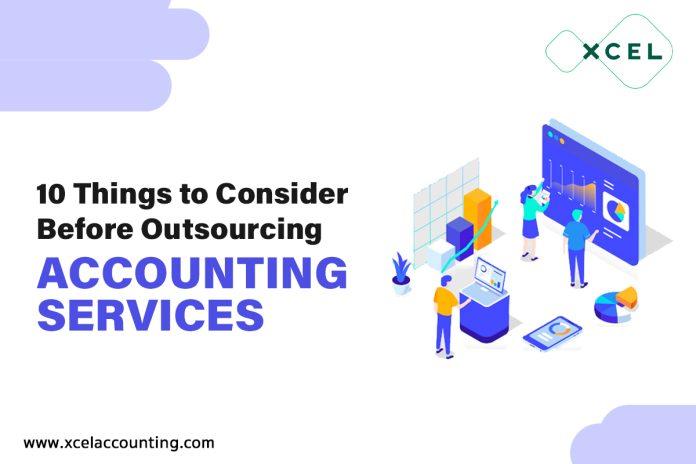Outsourcing accounting services has become increasingly popular in recent years. Many businesses, both large and small, are opting to outsource their accounting functions to external accounting firms.
This is because outsourcing offers many benefits, including cost savings, improved accuracy, and access to specialized expertise. However, before making the decision to outsource accounting services, there are a number of things to consider.
- Cost
One of the main reasons businesses choose to outsource accounting services is cost savings. However, it is important to consider the overall cost of outsourcing. While outsourcing may save money in the short term, there may be hidden costs that could outweigh any savings. It is important to consider the cost of the service, as well as any additional expenses, such as set-up costs, software licensing fees, and training fees. It is also important to consider the cost of the service over the long term, as some outsourcing contracts may have a minimum duration or renewal clause.
- Expertise
Outsourcing accounting services provides access to specialized expertise. However, it is important to ensure that the outsourcing provider has the necessary expertise to meet the needs of the business. This may include expertise in a particular industry, such as healthcare or manufacturing, or expertise in a particular area, such as tax compliance or financial reporting. It is important to evaluate the outsourcing provider’s credentials and experience before entering into an agreement.
- Confidentiality
Accounting records contain sensitive and confidential information, such as financial statements, tax returns, and employee payroll information. It is important to ensure that the outsourcing provider has appropriate policies and procedures in place to protect this information. This may include secure data storage, restricted access to information, and confidentiality agreements with employees. It is also important to ensure that the outsourcing provider complies with any applicable data protection regulations, such as GDPR.
- Communication
Effective communication is essential when outsourcing accounting services. It is important to establish clear lines of communication and ensure that the outsourcing provider is responsive to queries and concerns. This may include regular status updates, timely reporting, and regular meetings to review performance. It is also important to ensure that the outsourcing provider has a clear understanding of the business’s needs and objectives, and is able to provide tailored advice and support.
- Scalability
As a business grows, its accounting needs may change. It is important to ensure that the outsourcing provider is able to scale its services to meet changing needs. This may include adding additional services or increasing capacity to meet increased demand. It is also important to consider how the outsourcing provider will handle changes in the business’s accounting needs, and whether there are any additional costs associated with scaling up or down.
- Service Level Agreements
Service level agreements (SLAs) are a key component of outsourcing contracts. SLAs define the scope of the services to be provided, as well as the performance metrics that will be used to measure the outsourcing provider’s performance. It is important to ensure that the SLAs are clearly defined, measurable, and aligned with the business’s objectives. It is also important to ensure that there are penalties or incentives in place to encourage the outsourcing provider to meet or exceed the agreed-upon performance metrics.
- Quality Assurance
Outsourcing accounting services requires a high level of trust. It is important to ensure that the outsourcing provider has appropriate quality assurance processes in place to ensure that work is completed accurately and in a timely manner. This may include regular quality control reviews, peer reviews, and internal audits. It is also important to ensure that the outsourcing provider has appropriate training and development programs in place to ensure that its employees have the necessary skills and expertise to perform their roles effectively.
- Compliance
Outsourcing accounting services can help businesses comply with complex regulatory requirements. However, it is important to ensure that the outsourcing provider has a clear understanding of the applicable regulations and is able to provide the necessary advice and support to ensure compliance. This may include regulations related to tax, financial reporting, data protection, and other areas. It is important to ensure that the outsourcing provider is familiar with the relevant regulations in the jurisdictions in which the business operates, and is able to provide advice on any changes to regulations that may impact the business.
- Reputation
The reputation of the outsourcing provider is an important consideration. It is important to conduct due diligence on the outsourcing provider to ensure that it has a strong reputation and a track record of delivering high-quality services. This may include reviewing references, conducting online research, and seeking recommendations from other businesses in the same industry or with similar accounting needs.
- Cultural Fit
Outsourcing accounting services may involve working with people from different cultures and backgrounds. It is important to ensure that the outsourcing provider is able to work effectively with the business and that there is a good cultural fit. This may include factors such as language, communication style, and work ethic. It is important to establish clear expectations and guidelines for working together, and to ensure that there is a good understanding of each other’s cultural norms and practices.
FINAL THOUGHTS:
In conclusion, outsourcing accounting services can provide many benefits to businesses, including cost savings, improved accuracy, and access to specialized expertise.
However, before making the decision to outsource, it is important to consider a number of factors, including cost, expertise, confidentiality, communication, scalability, service level agreements, quality assurance, compliance, reputation, and cultural fit.
By carefully considering these factors, businesses can ensure that they choose the right outsourcing provider to meet their accounting needs and achieve their business objectives.
